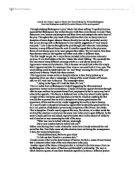Dramatic Quality of the Central Scenes in 'Dr Faustus' by Christopher Marlowe.
Dramatic Quality of the Central Scenes in ‘Dr Faustus’ by Christopher Marlowe 'Dr Faustus' is considered by many to be a tragic play, in fact, Marlowe himself called it, ‘The Tragicall History of the Life and Death of Dr. Faustus’. However, there are several scenes in the middle of the play (scenes 6 to 11) which can be considered to be comical scenes, which do not fit into the stereotype of tragedies of the time. They can be considered to be interesting scenes in their own right, but their overall purpose and their closely linked end dramatic quality, is examinable. The central scenes are in place chiefly to interject humour into what would otherwise be a grave and serious play. They also work to parody the main plot and at the same time aid foreshadow Faustus’ downfall later on in the play. Both of these effects add to and improve the dramatic quality of 'Dr Faustus'. They add another dimension to the play and prevent it from being purely a grim and flat tragedy; without these central scenes, the play may not be as interesting and may be lacking in dramatic quality. The central scenes add another level to Faustus’ character, showing the audience how his behaviour and attitude to life have changed giving us a break from the overall tragedy of the play. They also contribute to plot development in that they help further the play’s themes. For example, the scenes with Robin and Rafe (scenes 6 and 8) parallel the main plot. Although the pace here is faster, one must remember that the central scenes are relatively short, so the meaning and purpose of including these scenes must be more obvious. The comedy in these scenes adds to the tragedy of Faustus, showing comedy against Faustus as he is given great powers but uses them to perform petty tricks, therefore ridiculing his character and making the themes more complex. Several new characters are introduced in the central scenes. Their purpose is primarily to develop the plot and to shape the audience’s opinion of Faustus by showing how he interacts with those characters and by drawing parallels to him.







